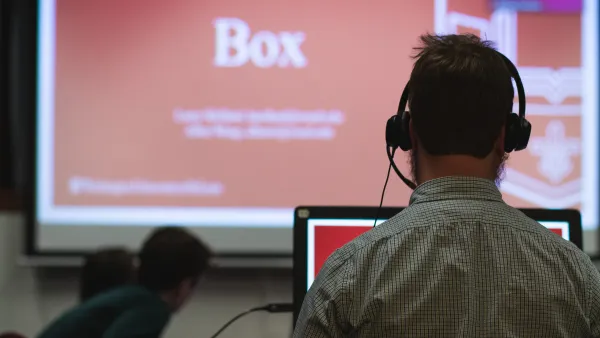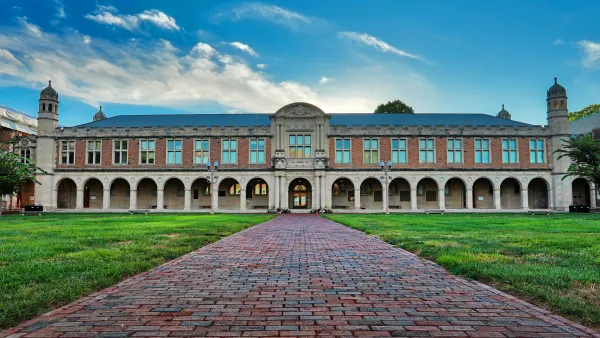Arts & Sciences staff have been essential to moving classes online in the wake of the COVID-19 outbreak, often embracing new roles and working across units to build training modules and support systems for faculty who are now teaching remotely.
Allen Wang’s typical workday looked very different a few weeks ago. Wang, a senior technical support specialist in Arts & Sciences Computing, used to visit the offices of faculty and staff to troubleshoot IT issues. By the second week of March, though, he was at the front of the classroom himself, leading in-person and virtual training sessions about Zoom for faculty and staff.
“It was challenging for me since I’m not a trainer or public speaker,” Wang said. “I got this Zoom trainer assignment and needed to prepare the materials and be ready to train clients within three days.” Wang watched his recorded training videos after each session to improve his method and make his material easier to digest. “It was my honor to train the clients to use the basic Zoom meeting and help them to get going,” he said.

Staff from across Arts & Sciences worked tirelessly to transition courses online in the wake of new campus guidelines related to COVID-19. In one short week, nearly 100 staff members from multiple units trained in new online tools to provide faculty and students with a workable virtual learning environment. At the same time, they also had to pack up their on-campus offices and transition their own workflows to be able to carry out their jobs remotely.
Arts & Sciences Computing, led by director Ken Keller and associate director Marcia Mannen, has driven the training efforts, and many staff members have pivoted to new responsibilities that meet the increased need for faculty support. “The training has gone extremely well considering the large number of people involved and the short amount of time to put it together,” said Mannen. “The pain point for us in computing was getting info to the faculty about what resources are available to teach online so that they can make informed decisions about what will best suit their classes.”
Moving classes online has been a monumental group effort. Mannen notes that there has never been a policy that faculty must use online tools like Canvas as part of their curriculum, and so “we were not staffed to support moving all Arts & Sciences courses online. The Canvas team in particular, Lucas Heberlie, Amy Baker, and Megan Radcliff, worked closely with Canvas leaders from across the university to develop training modules. An incredible number of staff, graduate students, and faculty stepped up to serve as support for faculty making that transition.”

In a short amount of time, the computing support team quickly created in-person and virtual training sessions for Zoom, Canvas, Kaltura, Microsoft Teams, and more. The many departmental staff members that have attended these trainings now serve as helpers for faculty as they transition to virtual classrooms.
Erin Gerrity, coordinator of communications and student affairs in the Department of Biology, was surprised at how smoothly the transition to remote teaching has gone in her department. “We have over 40 courses plus all of the associated labs and discussions,” she said. “Faculty and staff alike have been thoughtful, creative, flexible, and patient. During these surreal times, you might expect everything to come apart at the seams, but it’s been quite the opposite with all of us working hard to keep it together.”
The transition to remote classes was made possible by staff who embraced new job functions and collaborated with colleagues from across campus. Brian Harting, an administrative coordinator supporting the Department of History, said that a potentially stressful situation was made easier by his colleagues’ efforts. “This experience has made me realize just how much Arts & Sciences is more than just a school but also a wonderful community pulling together during this moment of crisis,” he said.
David Archer, the computer support manager in the Department of Psychological & Brain Sciences, echoed that sentiment and added that he was thankful to have the opportunity to use technology to support a community that he loves. “The reason that I love working at WashU,” he said, “is because I’m able to do two of the things I like most: helping people and applying different technologies/services. I thankfully have many tools at my disposal that I hope are making work life easier for the faculty and staff during this unprecedented event.”
The stories of staff members who made the quick transition to remote learning possible at WashU are a testament to the university’s sense of community and mission. “Everyone has pivoted to new roles to support this transition to distance learning,” said Barbara Schaal, dean of the faculty of Arts & Sciences. "It is inspiring to see us come together in the true WashU spirit to meet the needs of our students. I am so deeply grateful to our community for their hard work, perseverance, and dedication.”



